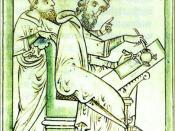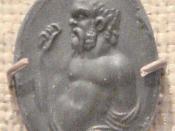The Republic; Failure To Account For Individual Human Nature In Plato's Republic, Socrates is attempting to define justice/morality. In order to define justice, Socrates constructs a model utopia where it will become more apparent what morality/justice actually are. An aspect of this theoretical utopia that Socrates strongly emphasizes is unity and harmony of the community as a whole single entity, he also fails to take into account the importance of private life of the individuals inside the community. The reason Socrates' theoretical community fails is because the laws of the community extend to far into the private life of individuals. Which leaves the question, how far should laws extend into and regulate the private realm of life? In order for Socrates' perfect community to function at its best, Socrates assigns people an occupation, taking away the individuals' right to choose. Socrates establishes a myth that will be the rule in assigning jobs to the people.
The myth is the Myth of Metals and it states "'but the god, in fashioning those of you who are competent to rule, mixed gold in at their birth; this is why they are most honored; in auxiliaries, silver; and iron and bronze in the farmers and the other craftsmen,'"ÃÂ (415a). The Myth of Metals says that people will be assigned jobs based on their natural abilities. Even when an individual is to become a craftsmen, they do not get to choose which craft will become their occupation, they are assigned whichever craft they will excel the most at, they do not get a free choice.
Every individual is the community will therefore be performing the occupation they are best suited for by nature. This would theoretically ensure the smoothest functioning of the community, but fails to take into account human nature. Although...


